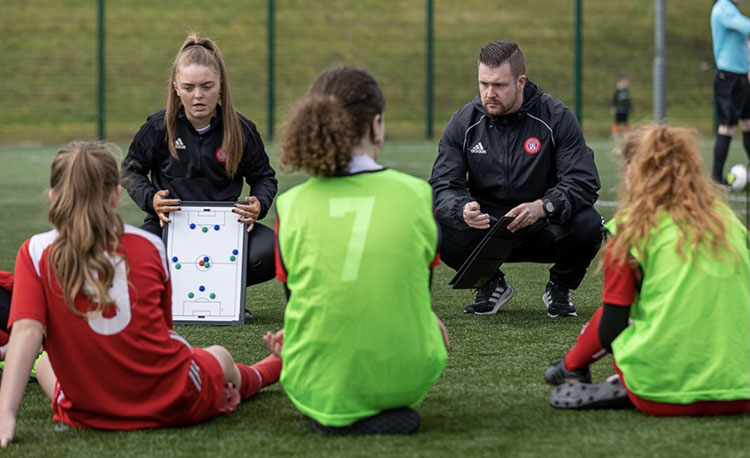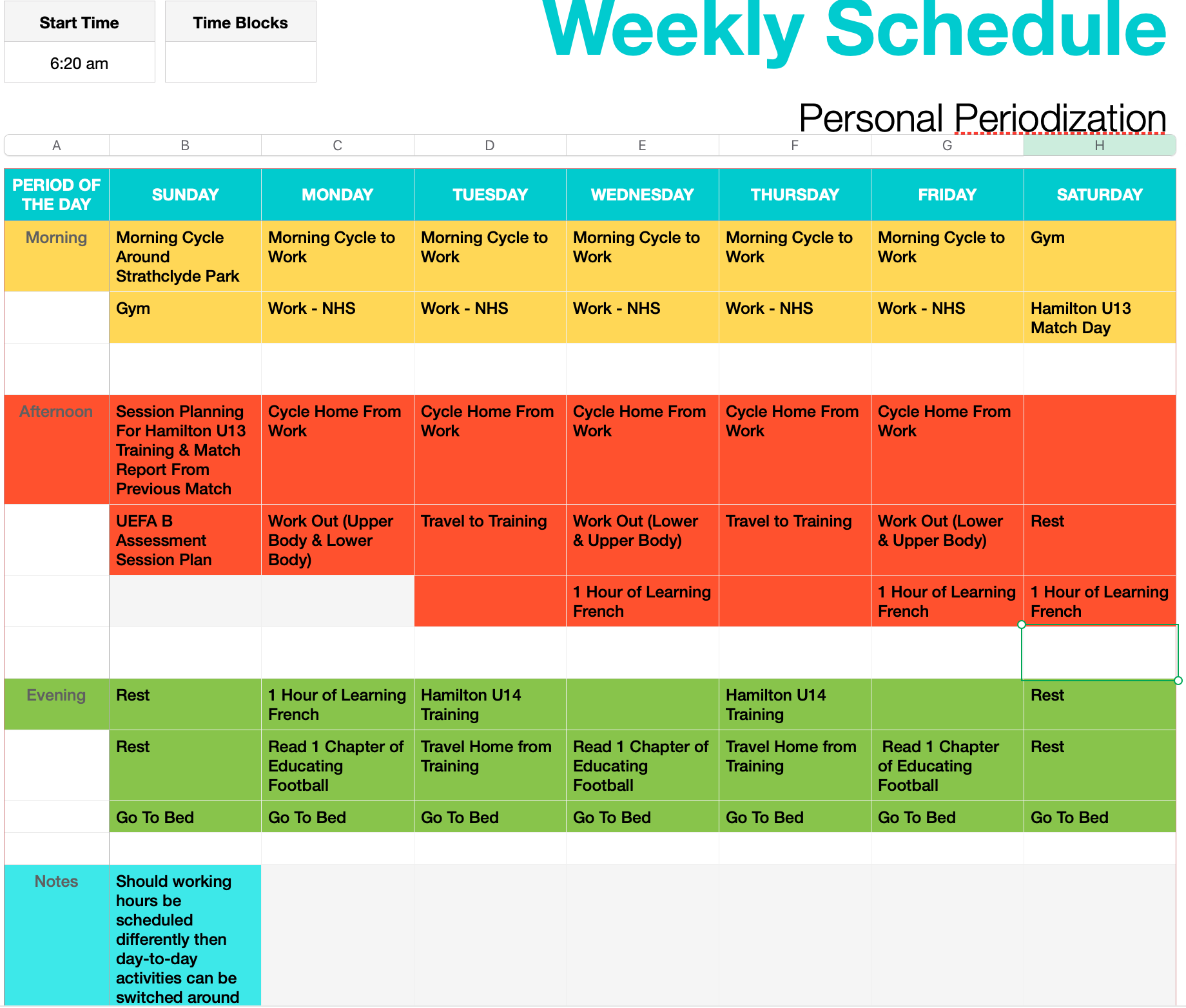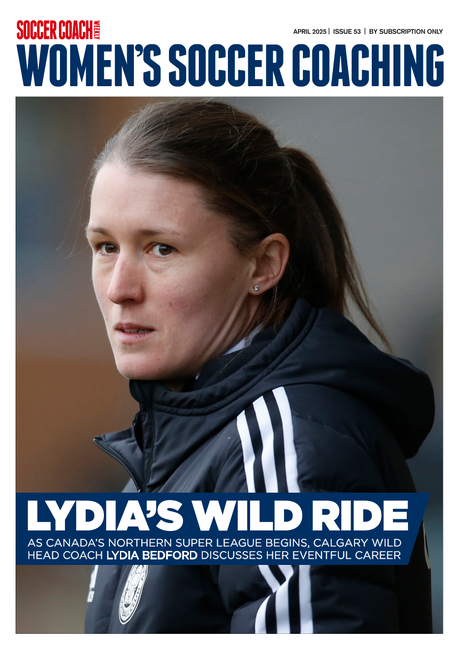You are viewing
1 of your 3 free articles
7 tips for a healthy work-life balance
Coaching Adviceby Chris Bennett
Juggling a full-time job with part-time or volunteer coaching can be very tiring. Chris Bennett advises how to structure your life and claw some time back...
Two years ago, I returned to Scotland having just lost my job in a school in Mexico, due to a cut in their foreign employees.
As Covid-19 struck, and with opportunities at home and abroad few and far between, I decided to step out of my comfort zone by getting involved in the women’s game.
I was aware not having a driving licence or my Uefa B badge was holding me back from progressing, so I set myself some goals - including securing full-time employment, continuing my coach education and investing in myself to enhance my career prospects.
But balancing a full-time job with a part-time coaching role, coach education and a social life is undoubtedly a challenge.
Here are my top tips for maintaining a good work-life balance within soccer...
01 - Personal Periodisation
Training periodisation is how we schedule our players' workload throughout the week in the build-up to matchday.
It ensures our players are able to train to their maximum, and receive sufficient rest time, while also operating at peak performance levels during the game.
I have taken this principle and come up with my own 'personal periodisation' (see graphic). I use this to balance my work and personal life - it includes my work hours, fitness routines, coach education, training sessions, match days and planning.
I follow it religiously, as it allows me to earn money and stay healthy and fresh, while pursuing my career in football.
You have to be prepared to make compromises and be open to adapting your personal periodisation schedule as you go.
There will be times when you can’t complete a task due to other commitments - just be sure to prioritise the tasks that are most important to stay on track.
02 - Healthy Diet
I have noticed a massive difference in my energy levels by ensuring my diet is clean when trying to balance all the different activities in my daily life.
On a day where I have an eight-hour shift, then deliver a training session, it can be easy to grab fast food. While it may be beneficial for my time-keeping, I know it is not the best thing for my body and can often make me feel lethargic when coaching.
Instead, I buy 'prepped meals' from my gym in bulk each week. A clean diet goes a long way to preserving energy for the day ahead.
03 - Sleep Well
A good sleep pattern is every bit as important as a healthy diet. We know at least eight hours of sleep per night is recommended. That is not always possible - however, we can adapt it around us.
I aim for around seven hours of sleep most nights. I allow myself a long lie-in on a weekend when I know I will have fewer activities taking place.
04 - Use Time Effectively
This is a big one for me, especially as a non-driver who has to rely on trains to get me from work to the training pitch.
I tend to use the calendar and notes apps on my phone to keep track of what I have on each day.
Over the past year, I’ve made a few changes to claw back some time. These include cycling to and from work, which has replaced my cardio in the gym, and lifting weights at home before work, on days where I have to coach in the evening.
It is not uncommon that I have to wait for trains while travelling to or from coaching, so I use that time to practice learning French. I have also got into the habit of responding to emails and texts as soon as I receive them - although it is a small task that takes a matter of seconds, I prefer to have it taken care of.
By doing all this, I stay on track with my goals each day and free up time.
05 - Plan Ahead
Regardless of the club I’m working for, I always plan for the year ahead prior to the beginning of pre-season.
This allows us to put goals in place and provide a clear vision for players, coaches, parents and key figures involved at the club.
If I find myself with a day where I don’t have much on, I may even plan sessions two or three weeks in advance to give myself a buffer. Having a curriculum in place for your team makes this possible.
Due to the pandemic, I had five different courses running in 2021 - Uefa B licence, children’s coaching licence, performance analysis, neurolinguistic programming diploma and Coerver youth diploma.
All of these included assignments - however, by planning ahead and setting aside time in advance to complete these, I’ve been able to pass four of the five courses.
It may not work for everyone but I’ve found planning ahead very useful.
Related Files
WSC-016-7-tips-for-a-healthy-work-life-balance.pdfPDF, 513 KB

Chris Bennett (right) is an Under-14s coach in Scotland but has also worked in England, Ireland, Italy, Mexico, USA and Vietnam
06 - Know When to Switch On and Off
It is important to know the real difference between switching on and switching off.
'Switching on', to me, means you’re all in, focused and working hard. 'Switching off' means you are now in the recovery phase and no longer thinking about your work or coaching. Effectively, you are resting.
I find it almost effortless to switch on and off when it comes to my job. It’s literally a case of as soon as the buzzer goes to start the day, they get a good worker.
Once that buzzer goes at the end of the day, though, I forget about everything that has happened in the last eight hours as I just don’t have a passion for it.
Coaching on the other hand is quite difficult to switch off from. That is because I really do have a passion for it and my mind is always thinking about how I can make things better, or more challenging.
"Coaching is difficult to switch off from because I really do have a passion for it..."That being said, sometimes we need time to decompress from coaching in order to maintain a healthy balance between our work life and personal life.
The way I try to do this is by only answering coaching-related calls or messages, or doing any coaching-related work, between the hours of 8am and 8pm.
It seems to work well for me as I’m able to recharge properly and have time to myself before going to bed.
I purposely chose 8pm because that is when training finishes for our teams. It means that, once I leave the training pitch, my work day is considered finished until the next morning.
I will still reply to people as soon as possible within that 12-hour window during the day, but I also have to be selfish.
It is in my best interests to unwind after a long day as it allows me a chance to recover for the following day.
07 - You Must Make Time For Your Hobbies
Everyone’s idea of fun will be different - but I can’t stress enough that, no matter what yours is, you must make time for it.
My hobbies include going to the gym, watching football on TV or going to a live game, travelling, hiking and socialising. I do most of these each week.
Obviously, things like travelling only take place a couple of times a year but I still make time for it.
My hobbies tend to take place where there are gaps in my personal periodisation schedule. They provide a good link between all the work I do to achieve my goals and the fun part of the week.
We should never lose sight of the fact we have a personal life. It is every bit as important as work and, essentially, what we work for every day.
Newsletter Sign Up
Newsletter Sign Up
Discover the simple way to become a more effective, more successful soccer coach
In a recent survey 89% of subscribers said Women's Soccer Coaching makes them more confident, 91% said Women's Soccer Coaching makes them a more effective coach and 93% said Women's Soccer Coaching makes them more inspired.
*includes 3 coaching manuals
Get Inspired
All the latest techniques and approaches
Women's Soccer Coaching offers proven and easy to use soccer drills, coaching sessions, practice plans, small-sided games, warm-ups, training tips and advice.
We've been at the cutting edge of soccer coaching since we launched Soccer Coach Weekly in 2007, creating resources for the grassroots youth coach, following best practice from around the world and insights from the professional game.







